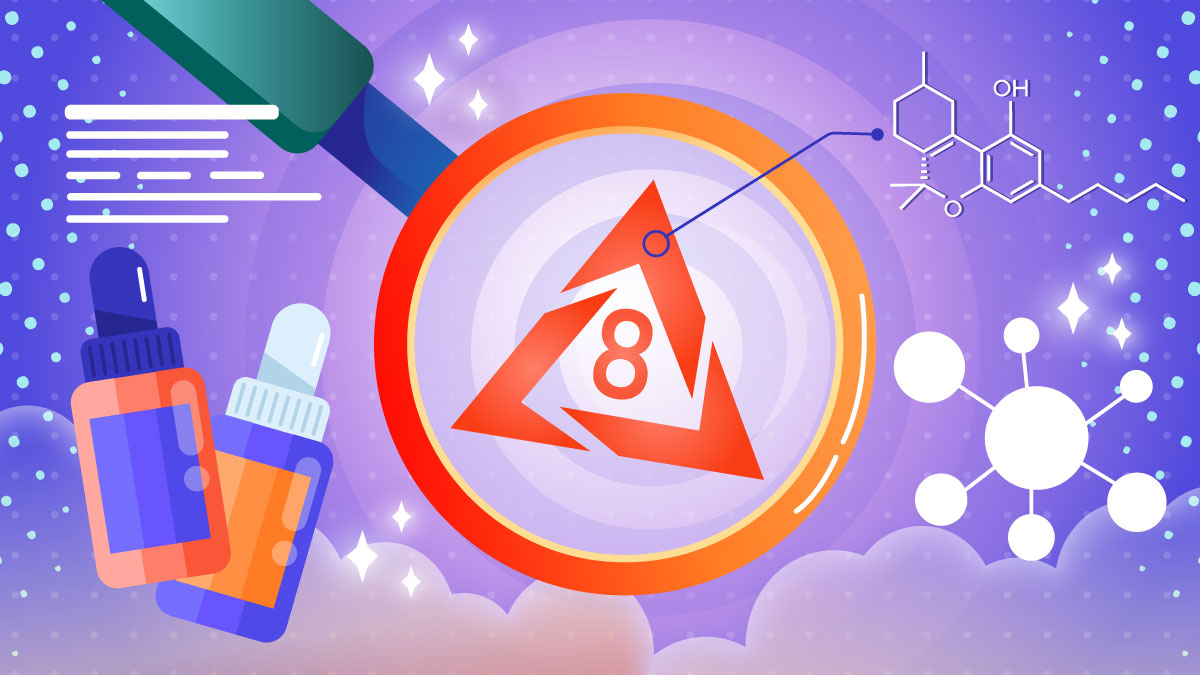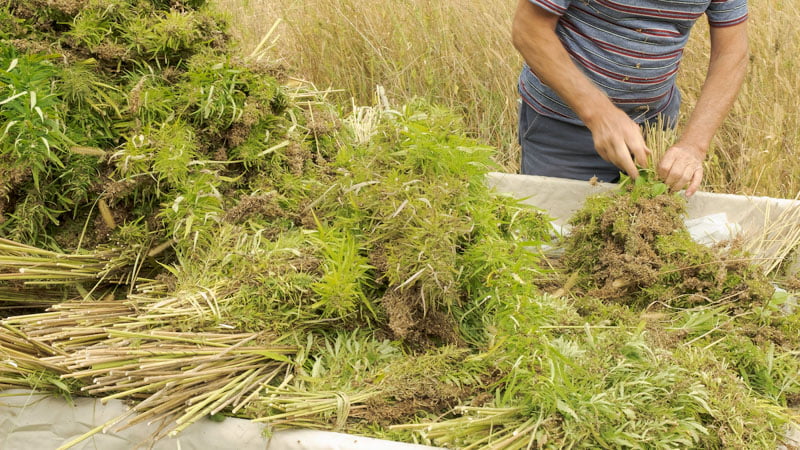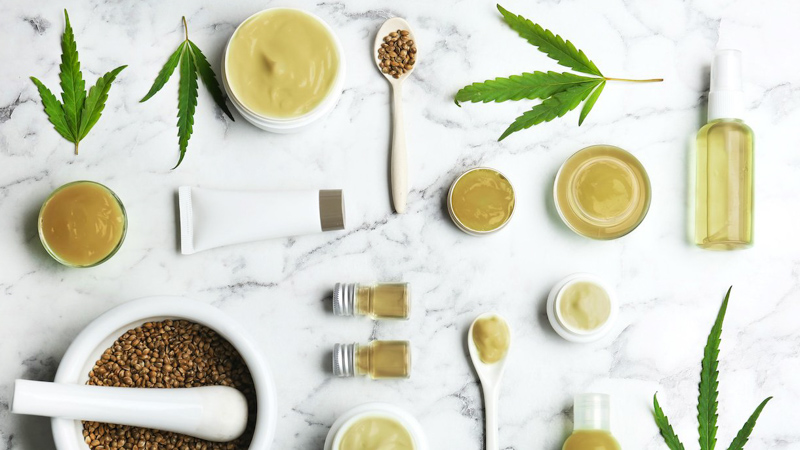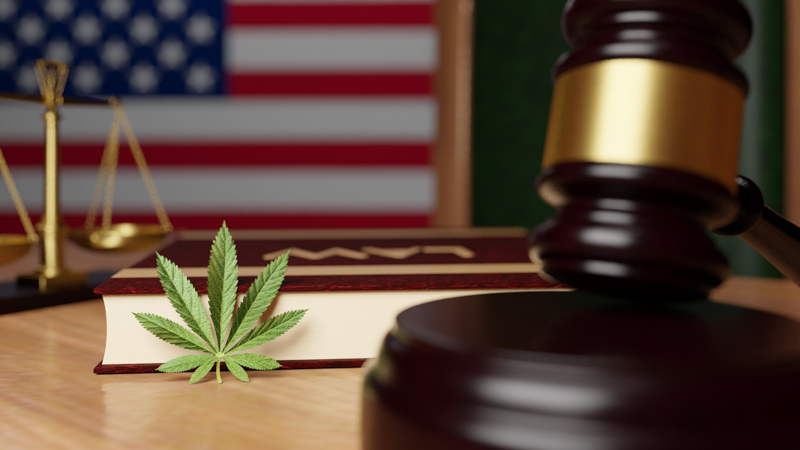How Is Delta 8 THC Made?

If you thought that delta 8 THC is made through some alchemy or magic, you might want to verify your outlook on this. As a matter of fact, the extraction of delta 8 THC is a much less complicated process than one would expect; still, there are some risks and precautions that you shouldn’t ignore.
This article focuses on the basic principles behind a safe and efficient delta 8 THC extraction.
We’ll cover:
- The way cannabis plants can produce delta 8 THC
- How CBD is converted into delta 8 THC
- The legal status of delta 8
- A simple way to make delta 8 THC at home
- Safety considerations regarding delta 8 extraction
Let’s learn some science.
What Is Delta 8 THC?
Delta 8 THC is one of over 115 identified cannabinoids in the cannabis plant. Other popular cannabinoids include CBD, CBD, CBC, CBN, and delta 9 THC.
When people talk about THC, they often refer to delta 9 THC, which is the main psychoactive ingredient in most marijuana strains.
Delta 8 THC, short for delta-8-tetrahydrocannabinol is an analog of delta 9. In other words, it has a similar molecular structure, with a slight difference in the arrangement of its atomic bonds. This little detail makes them a bit different when it comes to their effects.
Delta 8 THC is about half as potent as delta 9 THC. Its cognitive effects aren’t also that overwhelming in high doses, not to mention that it also has a lower incidence of anxiety and paranoia.
For that reason, many cannabis users who are reactive to the trippy character of delta 9 are turning to delta 8 THC now.
But, as with any compound that you ingest, you may want to know how delta 8 THC is made.
This drives us to the next important question.
Does Cannabis Produce Delta 8 THC Naturally?

No, cannabis doesn’t synthesize delta 8 THC by itself.
This cannabinoid can form as a result of THC’s degradation over time. Nevertheless, the amount that comes from this process is minuscule. The vast majority of THC turns into CBN as the plant ages; CBN is a potent sedative that can be used in combination with delta 9 THC for sleep disorders.
Producing significant amounts of delta 8 THC calls for specialized lab equipment and well-trained staff. Laboratory testing is another important factor, as the extraction process sets a few obstacles that can be difficult to overcome by an inexperienced extractor.
Let’s take a look at how delta 8 THC is made.
How Is Delta 8 THC Made In The Lab?
As mentioned, delta 8 is a non-synthetic cannabinoid that naturally exists in the cannabis plant, but it’s more commonly made in a laboratory due to the aforementioned reasons. Since delta 8 is the analog of delta 9 THC, it would be reasonable to assume that marijuana plants are the best for extraction.
While it’s true that marijuana will yield larger quantities of this cannabinoid, it has one major limitation — it’s not legal everywhere in the USA. So far, 16 states have legalized weed for recreational use, and the plant remains a Schedule I controlled substance according to federal law.
This is where hemp comes into play.
Hemp plants are federally legal, thanks to the 2018 Farm Bill. Since the latest scientific breakthroughs, manufacturers have obtained delta 8 THC from hemp using a special conversion process from CBD.
Hemp-derived delta 8 THC products contain 0.3% of delta 9 THC or less, so they’re also legal on a federal level.
Below we explain the entire process from roots to branches.
Converting CBD to Delta 8: How It’s Done
All cannabinoids are formed from cannabigerolic acid (CBGA), also known as the mother of all cannabinoids. This molecule evolves throughout the plant’s life cycle into every natural cannabinoid that we encounter — from CBD to THC and beyond. These biological conversions are influenced by several factors, including genetic, stress, and environmental exposures.
Because cannabinoids share a similar chemical makeup, translating this natural conversion into laboratory conditions is actually quite easy. Long before delta 8 THC made its name on the commercial cannabis scene, lab technicians have been using similar conversion procedures to make exotic cannabinoids out of the traditional ones.
Now the same technology has been applied to delta 8 THC extracts.
As we said, delta 8 THC occurs in many cannabis strains but typically in negligible concentrations. To extract and isolate delta 8 THC from the raw plant with less than 1% per dry mass would be cost-prohibitive. That’s why manufacturers have begun to implement the conversion process, extracting delta 8 THC from the dominant cannabinoids like CBD or delta 9 THC.
Another reason why delta 8 THC has become so popular is thanks to the booming CBD market. The CBD space is becoming oversaturated, so the surplus of CBD now has another stream to flow — this time into delta 8 THC products.
Both CBD and delta 9 THC are decent options for making delta 8 THC, but since CBD is a more popular candidate, we’ll cover the conversion using its example.
Step-by-Step: How Is CBD Converted Into Delta 8 THC?
Now that you know that delta 8 THC is made from CBD, let’s look at this process. Delta 8 THC was first isomerized decades ago by Raphael Mechoulam, G.R. Webster, and Leonard Sarna. They also patented one variation of the process.
The following step-by-step guide explains how delta 8 THC is made based on the patent notes:
- Dissolve CBD into a Solvent – delta 8 THC doesn’t go well with ethanol extraction, unlike other cannabinoids. It requires a non-polar organic solvent, such as heptane.
- Mix the Solvent with Acid and Stir – introduce acid to the solvent solution, keeping it at 100 C while continually stirring for at least 18 hours (it will be good to have a stirrer hot plate). Popular acids include hydrochloric acid, p-toluene sulfonic acid, and alumina acid-washed.
- Test Different Combinations of Solvent-Acid – there are several different combinations that you can use, which can all transform CBD into delta 8 THC. Each combination will yield different results and require different times (but usually up to 18 hours). The selected method can also leave different byproducts and residues that will require purging.
- Wash and Dry – once delta 8 THC has been made and the upper phase has been separated, you’ll need to wash and neutralize the solution. According to Mechoulam’s patent, using an aqueous 5% NaHCO3 (sodium bicarbonate) is best.
- Test the End Product in a Lab – high-performance liquid chromatography (HPLC) is the best testing method. Testing is paramount to confirm purity because conversion is never 100% and will leave various byproducts that can be toxic.
Delta 8 THC Product Options

Delta 8 THC products come in the same formats as other cannabis extracts. Some of the most popular product types include:
- D8-Infused Tinctures
- D8 Vape Carts
- D8-Infused Gummies
- D8 Oil Encapsulate
- D8 Concentrates
- D8 Sprayed Flower
The effects of delta 8 THC are milder and more enjoyable; it promotes relaxation but doesn’t get the user anxious in high doses, unlike delta 9 THC. Still, it’s possible to experience side effects like sedation, drowsiness, confusion, or inability to focus.
There’s very little research conducted on this cannabinoid, which is why we advise consumers to be cautious when trying delta 8 THC for the first time.
The Risks Involved In Making Delta 8 THC
Despite its simplicity, the conversion process from CBD to delta 8 THC requires harsh chemicals to catalyze this reaction, which may leave undesired byproducts in the final extract.
We recommend purchasing delta 8 THC extracts made by reputable manufacturers instead of trying to convert CBD into delta 8 on your own — unless you own a laboratory and have strong skills in organic chemistry.
Here are the things to watch out for when making delta 8 THC:
1. Acid Is Caustic
The acids and solvents needed to convert CBD to delta 8 THC are highly caustic and poisonous. Some of these compounds can evaporate into the air without you even realizing it. If you don’t know how to control these chemicals and work with them safely, you may be putting yourself at serious risk.
2. Unwanted Byproducts Can Be Toxic
The very conversion process can be difficult. In simple terms, if you add too little or too much acid, don’t run proper testing, or use contaminated products — you may experience an array of side effects that aren’t related to using delta 8 THC. These compounds are often toxic and can cause cancer.
Everything that you ingest should be pure — or the risk of toxicity increases substantially. It can be almost undoable to determine all the different byproducts if you’re not using pure ingredients. This includes the hemp material and the acids, solvents, and washes used to produce delta 8 THC.
You can find online instructions for ways to convert CBD to delta 8 that use typical chemicals found at your local hardware store — but this is highly dangerous. These ingredients aren’t lab-grade, meaning they can be contaminated. Running reactions with these solvents or acids can put you at high risk of creating potentially toxic byproducts.
3. Delta 9 THC Levels May Be Too High
The last warning is that conversion from CBD to delta 8 THC isn’t always 100% accurate. It may happen that you’ll end up with a mix of delta 8 THC, delta 9 THC, and other cannabinoids. Unless you reintroduce delta 9 THC in legally approved amounts (which is also risky), you may end up with an illegal extract with more than 0.3% of delta 9.
It would help if you didn’t attempt this extraction unless you have access to adequate lab equipment, take all the precautions involved with safety, and have a lot of chemistry experience.
Is Delta 8 THC Legal?

In short, yes, but there’s a bit of space for interpretation.
Hemp-derived d8 THC products are federally legal because they contain 0.3% of delta 8 THC or less. Except for a few states that have their own laws banning every form of THC (including delta 8), most of them don’t have any problems with this cannabinoid.
According to the current consensus, delta 8 THC products should meet two criteria to be considered legal:
- Delta 8 THC must be made from hemp-derived CBD
- Their THC content must be less than the federal limit of 0.3% of delta 9 THC.
This is why the standard extraction method involves converting CBD instead of delta 9 into delta 8 THC. Any products made from delta 8 THC from marijuana are labeled as Schedule 1 drugs and are only legal in states with their own adult-use marijuana laws.
Key Takeaways on How Delta 8 THC Is Made
It’s impossible to find a delta 8 THC-rich cannabis strain. While the cannabinoid is naturally derived, its negligible concentration in cannabis plants makes direct extraction cost-prohibitive.
Instead, most companies make delta 8 THC products with hemp-derived CBD, converting them into the compound. Using a simple conversion process and lab equipment, hemp companies can make affordable delta 8 THC extracts.
It’s worth noting that delta 8 THC products are still new to the cannabis space. Extraction, conversion, and testing methods are continuously improving. And, similar to the cannabis industry as a whole, the delta 8 space lacks regulation, meaning that you can find many poorly-made products out there.
Always make sure to buy d8 THC from reputable brands — preferably from those who have transitioned from CBD or make delta 8 THC as an addition to its CBD line. Such companies already have expertise when it comes to extraction, so they’re safer bets.